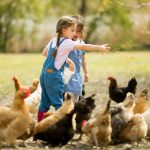
No time for “fowl” play: 5 Strategies to protect your chickens from avian flu
Wednesday, November 22, 2017 by Janine Acero
http://www.preparedness.news/2017-11-22-strategies-to-protect-your-chickens-from-avian-flu.html

The most severe outbreak of the avian influenza – commonly known as bird flu – in the U.S. happened in 2015. The occurrence triggered a wave of alarm for both consumers and poultry farmers. Since then, the price of eggs alone has increased by 58 percent, and grocery stores and restaurants have increased the cost of poultry products to restrict consumption. The outbreak has likewise affected owners of backyard chickens and large consumers of poultry alike, so it’s best to take proactive measures.
There is currently no solution or cure to this disease, so preventing it in the first place is the best option. If you are an owner of backyard chickens, here are five strategies to ensure that your flock remains healthy amid this deadly outbreak:
- Flock inspection and coop maintenance – Clean the coops at least weekly and check for mites monthly. Using herbs in the coops will even repel insects and keep your flock relaxed. Make routine inspections of your flock, from their comb (a pale comb is a sign of a sick chicken) to their feet (watch out for scaly leg mites or bumblefoot).
- Natural diet – Mix up your flock’s veggie diet with grubs, meal worms, worms and crickets for protein.
- Reduce stress – Give your flock plenty of room to move about; let them forage, but make sure to cover their free-range area with netting to protect them from predators. Keep the temperature in the coops just right to reduce their stress; cool your coop with air circulation in the summer, and use natural insulation to keep your flock warm in the winter. Additionally, let them sleep with the lights off to allow their bodies to rest naturally, and separate aggressive roosters from the rest of the flock to avoid stressful confrontations.
- Probiotics and healthcare – Probiotics help keep the digestive systems of both humans and chickens healthy. Give your flock fermented feed, as well as some apple cider vinegar and garlic to support good health. It is also advisable to give them food-grade Diatomaceous Earth which is a fine white powder made of the tiny fossilized remains of diatoms, a type of algae. It’s 100 percent natural, and is used to help prevent all manner of poultry ailments including intestinal worms, mites and lice. It’s recommended to add one pound of food-grade DE to every 50 pounds of feed to help prevent intestinal worms. You can also sprinkle some in the nest boxes, coop bedding, and dust bathing area to keep mites or lice at bay.
- Herbal supplements – Give your flock some herbs to support a healthy immune system. Oregano, for instance, contains antibiotic properties that may help prevent avian flu, blackhead, coccidia, e coli, infectious bronchitis, and salmonella.
On bird flu
There are numerous different strains of avian influenza, most of which do not cause illness in humans. The strains that have been affecting the nation are the H5N1 and the H5N8 viruses. H5N1, in particular, is known to have a high potential to initiate a pandemic. (Related: Pandemic bird flu virus just three mutations away, warn scientists.)
H5N1 can infect birds and other animals, causing diseases that affect multiple internal organs with mortality up to 90 to 100 percent, often within 48 hours.
Humans can get infected through touching their eyes, nose, or mouth after direct contact with an infected bird or prolonged contact with its droppings or mucus. Interestingly, wild fowl do not get sick even after being exposed to the same conditions.
According to the Centers for Disease Control and Prevention (CDC), “Domesticated birds (chickens, turkeys, etc.) may become infected with avian influenza A viruses through direct contact with infected waterfowl or other infected poultry, or through contact with surfaces that have been contaminated with the viruses.
“These viruses occur naturally among wild aquatic birds worldwide and can infect domestic poultry and other bird and animal species. Wild aquatic birds can be infected with avian influenza A viruses in their intestines and respiratory tract, but usually do not get sick.”
As previously mentioned, there are some individuals that don’t get sick even when infected with bird flu, primarily wild fowl. These birds live in natural habitats and feed on natural diets, developing a strong immune system against bacteria and viruses, as opposed to domesticated fowl that are confined in warehouse-style facilities called Confined Animal Feeding Operations (CAFOs) where they are crowded together by the thousands. They are also fed genetically engineered grains and are given antibiotics to control disease and induce weight gain.
Sources include:
Tagged Under: Tags: avian influenza, backyard chickens, bird flu, diet and immunity, domesticated fowl, H5N1, H5N8, homesteading, livestock, natural vs commercial diet, outbreak, Poultry, viral diseases, virus, wild fowl





